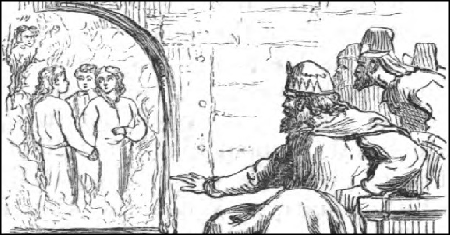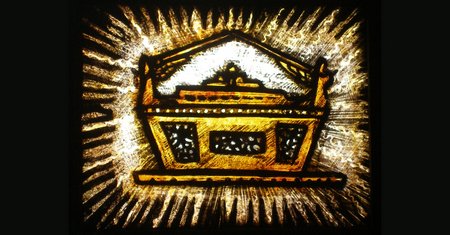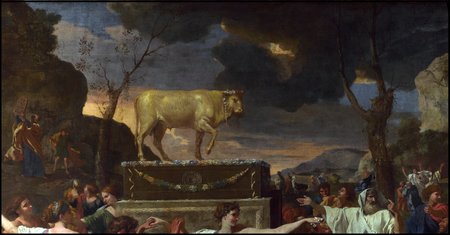Category: Obedience
Subject: Obedience
The Patternists: The Cost of Obedience

King Nebuchadnezzar had an image of gold made, proclaiming that all nations fall down and worship the image. Refusal to do so would result in death by fire.
At the signal given, “all the people, nations and languages fell down and worshiped the gold image which King Nebuchadnezzar had set up” (Daniel 3:7).
Three Jews did not obey King Nebuchadnezzar. Shadrach, Meshach and Abed-nego would not serve the gods of Babylon or worship the image Nebuchadnezzar had commissioned.
Their refusal came with great consequence. The text reveals that the king, “in rage and fury, gave the command to bring Shadrach, Meshach, and Abed-nego” (3:13). He demanded obedience from the three.
Sermon: Walking in Truth
A discussion about the emphasis that John places upon obedience to the truth that abides in us, using the text of 2 John. Truth, commandments, doctrine, they all mean the same thing in the context of the epistle. This is necessary for fellowship with God.
Included in the lesson is this wonderful poem about God’s word, attributed to John Clifford.
The Anvil of God’s Word
“Last eve I paused beside the blacksmith’s door,
And heard the anvil ring the vesper chime;
Then looking in, I saw upon the floor,
Old hammers, worn with beating years of time.
“‘How many anvils have you had,’ said I,
‘To wear and batter all these hammers so?’
‘Just one,’ said he, and then with twinkling eye,
‘The anvil wears the hammers out, you know.’
“And so, I thought, the Anvil of God’s Word
For ages skeptic blows have beat upon;
Yet, though the noise of falling blows was heard,
|The Anvil is unharmed, the hammers gone.”
The Patternists: So Walk in Him
In the book of Colossians, Paul warns his brethren about turning away from Christ, to embrace something else. He wrote, “As you therefore have received Christ Jesus the Lord, so walk in Him, rooted and built up in Him and established in the faith, as you have been taught, abounding in it with thanksgiving” (Colossians 2:6-7).
Paul’s exhortation to “walk in Him” is not without explanation. He clearly emphasizes that walking in Jesus is being established and abounding in the faith that they have been taught. Truly, “…faith comes by hearing, and hearing by the word of God” (Romans 10:17).
Sermon: Competing for a Crown
Based on 1 Corinthians 9:25, the sermon establishes the importance of self-control, rule following and endurance for the Christian. Using the metaphor of athletic endeavor, which the apostle Paul used as illustration.
Ruminations on Citizenship
As I am writing this article, the President has been impeached, and the Chief Justice of the Supreme Court is about to swear in the United States Senators as jurors in the impeachment trial. Impeachment is a political process, as designed by framers of our constitution. In this case, it is also a partisan process, as Democrat and Republican representatives and senators are dividing (or are projected to divide) almost exclusively along party lines in their votes on the matter.
This is a sad time for Americans. The partisanship and rancor that is present in our nation is disheartening. It has been this way before, many times. In fact, politically our republic is messy, and unrest may be considered a fact of life. In some ways it is as it should be in any democratic process. The conflict consists of words, and protests seldom lead to actual violence. For this we are thankful.
The Patternists: The Ark of the Covenant Plagues the Philistines

The theme of necessary obedience to please God is revisited time and again throughout both the Old and New Testaments. A summary of a time when the ark of the covenant was taken by the Philistines (related in 1 Samuel) is one such example of that theme.
Many will be familiar with the climactic scene in Raiders of the Lost Ark when the Nazis had their faces melted off because they opened the ark of the covenant. Perhaps the scene was inspired by what happened to the Philistines in 1 Samuel 5.
Continue reading “The Patternists: The Ark of the Covenant Plagues the Philistines” →
The Sad Reign of Hoshea
2 Kings 17 reveals Hoshea to be the final king of the Northern Kingdom of Israel. Israel had persisted in her idolatry and rebellion from the day she was established as a kingdom, as Jeroboam took the people away in rebellion against Solomon’s son Rehoboam.
Chapter 15 reveals that during the reign of Pekah, the Assyrians had come in, and raided the land, taking hostages back to Assyria. Only a short time later Shalmaneser, the king of Israel subjugated the nation, making a vassal of Hoshea, and imposing tribute money upon him (17:3). No longer was Israel a sovereign nation. When Hoshea tried to avoid paying the tribute, the conspiracy became known and the king of Assyria threw him into prison. (17:4). In the ninth year of Hoshea’s reign, with the king in prison, the Assyrians carried the people of Israel into captivity, and the nation ceased to exist.
This was the final end of generations of sin. While Hoshea’s reign was doomed to end in this way, (God’s judgment was inevitable), he was not faultless. He “did evil in the sight of the Lord” (17:2). Sin brings ruin, collectively and individually. It may be a slow descent into ruin, or a headlong rush, but the end is inevitable, as men rebel against the God of heaven. “For so it was that the children of Israel had sinned against the Lord their God… until the Lord removed Israel out of His sight, as He had said by all His servants the prophets. So Israel was carried away from their own land to Assyria, as it is to this day.” (17:7, 23-24).
May we learn from the sad example of Israel, and seek always to maintain faithfulness to the Lord. May we choose the way of righteousness rather than the way of ruin.
Click below to…
The Patternists: “For Three Transgressions … and for Four”
The book of Amos begins with a proclamation of God’s judgment against the nations. Jehovah included in these words of condemnation Damascus (Syria), Gaza (Philistia), Tyre, Edom, Ammon, and Moab — in addition to Judah and Israel.
He introduces each pronouncement of judgment with the words, “For three transgressions of [enter nation here], and for four, I will not turn away its punishment” (cf. 1:3, 6, 9, 11, 13; 2:1, 4, 6). The phrase is a typical way of expressing a measure of completeness. Three sins were bad enough, but the fourth was cause for God’s judgment, He had reached the end of His longsuffering.
Continue reading “The Patternists: “For Three Transgressions … and for Four”” →
The Lord’s Counsel
“Listen to counsel and receive instruction, that you may be wise in your latter days. There are many plans in a man’s heart, nevertheless the Lord’s counsel—that will stand” (Proverbs 19:20-21).
Wisdom comes from instruction. The reason for this? Wisdom is the perceptive application of truth. In order to act wisely, one must first know the truth. God’s truths, ultimate truths, are revealed in His word. If a man listens to those who know those truths, and comes to know them himself, he has established a foundation for wisdom. “So then faith comes by hearing, and hearing by the word of God” (Romans 10:17).
Men often reject wisdom for their own desires and goals. Truly, “There are many plans in a man’s heart.” Men design wicked, selfish and foolish plans that result in ruin. “No grave trouble will overtake the righteous, but the wicked shall be filled with evil” (Proverbs 12:21).
Their evil ends in ruin for two reasons. First, it is foolish. That is, what they do is most often self-destructive. By rebelling against God’s plans, they reject counsel that is designed to benefit man. God’s knows best, and yet men consistently reject His good counsel.
Second, rejection of God’s counsel leads to judgment. God said to Israel, “Woe to them, for they have fled from Me! Destruction to them, because they have transgressed against Me!” (Hosea 7:13).
Be wise. Listen to and heed God’s counsel. “The Lord’s counsel – that will stand.”
Click below to…
The Patternists: Great Harlotry
The Hebrew word translated harlotry in the Old Testament (NKJV) is zanah. It is translated whoredom in the KJV of the text. Actually, the entire phrase “has committed great harlotry” is the translation of that single word, as it is found in Hosea 1:2.
The word indicates wantonness. In effect, harlotry is to fornication as gluttony is to eating. Strong, in expressing this, adds to the definition “to commit adultery, usually of the female” words such as continually, great, and go a-whoring.
Sermon: The Purity of Our Motivation
In 2 Corinthians 5:12-21, the apostle discusses his motivation to serve Christ. A lesson we all would do well to heed.
The Patternists: What is the “therefore” there for?
A question I often ask in Bible class, “What is the ‘therefore’ there for?” When you see the word in the Bible, it typically serves to connect a truth with a proper response. In effect, “This is so, therefore do that.”
Such events in scripture help to flesh out the proper response of a child of God to circumstances, scenarios, provocations and blessings. Let me give you a few examples from scripture.
Continue reading “The Patternists: What is the “therefore” there for?” →
Walk Worthy of the Calling
“I, therefore, the prisoner of the Lord, beseech you to walk worthy of the calling with which you were called, with all lowliness and gentleness, with longsuffering, bearing with one another in love, endeavoring to keep the unity of the Spirit in the bond of peace” (Ephesians 4:1-3).
Since familiarizing myself with the verse above, it has been my common practice to pray to God that my walk be worthy of that calling to which God has called me. In this, I acknowledge that such a walk is my responsibility. In other words, by prayer I can not petition God to overlook my sins, and find me acceptable despite any ongoing rebellion on my part. Rather, my prayer is that I am living in such a way as to satisfy the standard God has established.
That is not to say that I can’t and don’t pray that God forgive me of my sins and failures. I can and do. It is simply an acknowledgment that God requires an obedient faithfulness on the part of His children. Paul recognized this, and begged the Ephesians that they would act as God had called them to act.
His description of that behavior is not exhaustive, but certainly representative. Lowliness, gentleness, longsuffering, love and a peaceful disposition should characterize the actions of every child of God.
Are you walking worthy of this calling to which God has called you?
Click below to…
The Patternists: The Test of Faithfulness

The Greek word translated “faithful” in the New Testament is defined thus by Thayer:
1) trusty, faithful;
1a) of persons who show themselves faithful in the transaction of business, the execution of commands, or the discharge of official duties;
1b) one who kept his plighted faith, worthy of trust; 1c) that can be relied on.
Consider definition 1a) related by Thayer. The term is used of persons who show themselves faithful in the execution of commands, or the discharge of duties. This is a significant truth. Throughout scripture, people faithful to God were considered faithful by Him because they obeyed His commands, and did what was required.
Continue reading “The Patternists: The Test of Faithfulness” →
An Evil Common Among Men
The wise man of Ecclesiastes used his book to consider the vanity of life lived under the sun. Put simply, life is not fair, and seeking for lasting happiness and value by trusting in the here and now is a mistake. He illustrated the main point of his treatise in chapter six by noting “an evil which I have seen under the sun, and it is common among men.” It was not an evil in the same sense we typically use it, that is, sin. Rather, it was the observation that many receive great physical blessings from God, but before they can be enjoyed, they lose their ability to enjoy their blessings. It may be illness, tragedy, or death, but “a foreigner consumes it” instead of them. “This is vanity, and it is an evil affliction” (vs. 1-2).
Consider this lesson, “For who knows what is good for man in life, all the days of his vain life which he passes like a shadow? Who can tell what will happen after him under the sun?” (12).
Rather than seeking joy and happiness in this fickle world, with all its injustice and uncertainty, the wise man instead places his hope in heaven. In order to gain that eternal reward, it is necessary to live a life of faithful obedience! “Let us hear the conclusion of the whole matter: Fear God and keep His commandments, for this is man’s all. For God will bring every work into judgment, including every secret thing, whether good or evil” (12:13-14).
Click below to…















